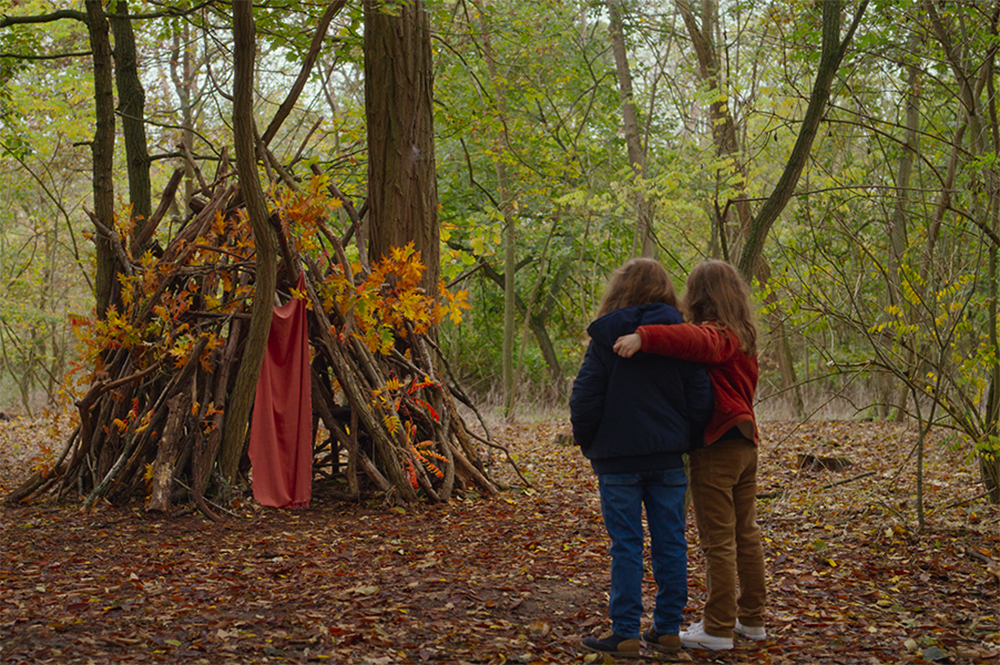Céline Sciamma’s follow-up to “Portrait of a Lady on Fire,” “Petite Maman,” is a sweet, tender, and fairytale-esque film that focuses on grief and escapism during your childhood. Even though it is only 72-minutes long, it is wholly enchanting and poignant.
Some auteurs have a way of writing and crafting beauty with uniqueness and style that is just pleasant to the soul. These directors have a skill set that makes their projects shine and resonate with the audience watching. Although it may feel like you have a broken heart, butterflies in your stomach, or a sword through your chest, they can impact you in many ways. One of them is Céline Sciamma, whose work always seems to ignite the candle inside of everybody’s anima.
And speaking of igniting, her most notable work was 2019’s “Portrait of a Lady on Fire,” which set fire to the old period piece romance movies and reinvented the subgenre. Not long after its success, she went on to work with Jacques Audiard as a co-writer for his film that premiered in Cannes, Paris, 13th District, which I’m very excited to see. Even so, she had something else planned, the follow-up to her critically acclaimed picture, “Petite Maman.” Again, by going into a “less-is-more” route, Sciamma blends the beauty of the more minor details and minimalistic fantasy elements.
After her grandmother’s death, Nelly (Joséphine Sanz) and her parents go to her mother’s childhood home. As her parents clean the house and move things to the truck, Nelly goes out to the woods and explores her surroundings. One day, she encounters Marion (Gabrielle Sanz), who is Nelly’s age and has a strong resemblance to her. The two become friends, start building a treehouse, have lunches, and talk about the changes coming to their lives; as Nelly lost her grandmother, Marion is only a couple of days away from the hospital to get an operation.
It all centers around grief and how losing someone causes complex changes to your life. When you lose someone at a young age, detachment is way more challenging; you don’t fully understand how things might change, but you do have that inner feeling that something is missing. As an adult, you know the changes, although some may come as a surprise; the anguish and pain seem a bit tougher once you have grown up. “Petite Maman” focuses on the childhood section, and it implements aspects of friendship and compassion while it has a fantasy element in its background.
It starts with a goodbye (or “au revoir” in French), as Nelly says her last farewells to several people who knew her grandmother and a slowly crawling sense of dread. However, it is not that dread that keeps you up at night worrying, albeit one that has you thinking that something is absent or misplaced. The atmosphere starts to brighten up once she meets Marion. As she befriends her and they build affinity for each other, the emotions sway from sorrow to delight. Even the audience goes with the flow and its sensations, to the point where it finally breaks your heart.
As I mentioned before, there is a fantasy element that has a Miyazaki feel. It might be because Hayao Miyazaki’s films deal with tough topics while still feeling heartwarming and charming. Like “My Neighbor Totoro” (1988), this is like a hug after having a terrible day or experience; that sensation of having someone there for you when you think the world is collapsing before you. It is magical realism captured on-screen; its most straightforward scenes and the children’s imagination, primarily thanks to cinematographer Claire Mathon.
Subtlety is pivotal, like most of Kelly Reichardt’s work, and one of the best aspects of the movie. There isn’t no showboating nor showing off; it is just the beauty in the details and set an ambiance that’s worth telling a story about. Although some pacing issues make some moments feel a bit longer, that seems purposeful. Those elongated moments are where the emotions roll in; heartache, sadness, and woe come again on-screen to switch into a scene of joy that helps fill the gaps.
It isn’t perfect nor near to be Sciamma’s best work; nevertheless, it is a feature filled with tenderness and comfort that it can’t be looked away from. Some problems here and there prevent the film from becoming excellent, yet it is somehow pleasant the way it is. A film to watch when it rains, when you are feeling down, or when you want to remember how it feels to be a kid again. To cherish those small moments with friends and being there for each other, learning how to forge a friendship. Sciamma knows how to make unique films, and although this is a bit more straightforward, this is no exception.
This review of “Petite Maman” is written from its screening at the 2021 Toronto International Film Festival (TIFF).

